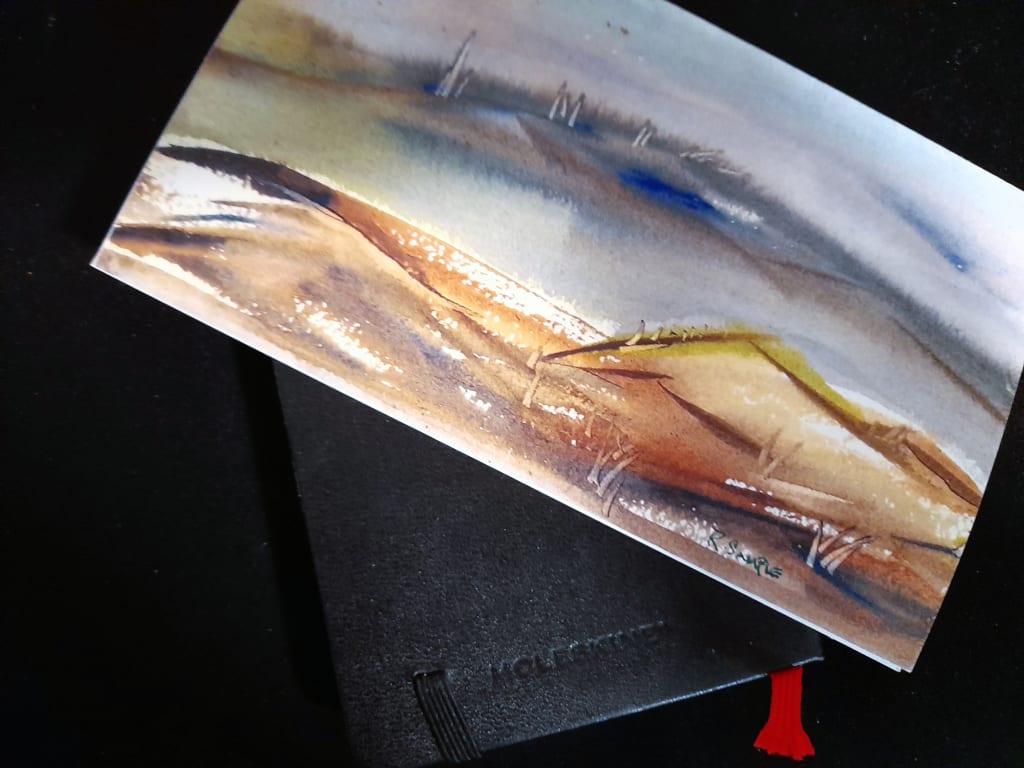What Is Meant to Be
Art, life, and friendship.

Upheaval. That was the correct word for the current state of Curtis’ life.
Between his family moving, his coming out, and his grief over his goal to become an artist, everything was chaotic. He knew being a teenager was supposed to involve angst, but this was a shade too far. He liked their new house, and his parents only wanted him to be happy, but there was a lot of new coming at him right now, and he longed for a little peace. The good thing about this move is their new neighborhood offered tons of new ideas for sketches, and art had always been an escape for him.
Curtis packed up his basic sketching kit and escaped out the backdoor to avoid his parents. He loved them, but he wasn’t in the mood for smothering.
He oriented himself at the end of the driveway and headed in the direction of the shore. As Curtis walked, he felt his shoulders loosen and his breath ease. Nothing calmed him like drawing, and this glorious June day called to him.
As Curtis descended the steep, sandy path to the beach, he began scanning the area for subjects. That piece of smooth and shadowed driftwood, or perhaps the trickle of a tiny waterfall down a rock face. He continued along the sand until he rounded a rocky outcropping and spotted a weathered lighthouse - perfect. He selected a rock that was as comfortable as he was likely to find - it was, after all, a rock - and settled down to start drawing. He pulled his backpack onto his lap and pulled out his precious black notebook, sketchbook, and his Blackwing pencils. He made a couple of notes on other potential ideas, tucked his notebook into his back pocket for the moment, and began to draw.
He slowly emerged from the completed art, feeling like he was surfacing from underwater. While drawing, he tended to be laser-focused, unaware of his surroundings other than his subject and his sketchbook. He looked at the page critically, knowing that it wasn’t what he was hoping for as a result, but unable to bridge the gap between the vision he had and what ended up on the page. He had spent hundreds of hours online, watching YouTube videos and browsing sites like DeviantArt, learning and getting feedback, but he wasn’t getting where he wanted on his own.
Curtis stretched and looked around as he swallowed some water and noticed someone else had set up not far from him with an easel and what looked like watercolors. Curtis focused on the watercolor paper pinned to the easel with clothespins, and his jaw dropped. The artist, an older man, was drawing the same lighthouse he was, but the lines! A fine black pen line had swooped across the paper first, somehow capturing the scene in only a few strokes - this curve or squiggle somehow painting the exact lines of form - he didn’t know how to describe it. The artist was now washing those lines with color, capturing the scene’s light and feeling, despite few details. Curtis looked back at his own sketch with disappointment, seeing how little what he’d drawn evoked the view in front of him. Frustrated, Curtis began to rip the page from the book but then stopped, knowing there was a chance to change it once he brought it home to the digital drawing tablet.
Curtis approached the older man hesitantly, knowing that artists often don’t want to be interrupted or share their work.
“Excuse me, sir, would you mind if I looked at your painting?” Curtis asked.
“You certainly can, although it isn’t much to look at. Not turning out at all like I wanted,” the man said gruffly.
“What?” exclaimed Curtis. “It’s incredible! I can’t understand how you can just…” Curtis gestured with his hands, attempting to illustrate the beautiful lines of the drawing and failing badly. “I wish I could capture it half that well. This is all I managed,” Curtis said, offering his sketchbook to the other artist.
The man took the sketchbook from him and looked at Curtis’s attempt to capture the lighthouse. Curtis watched his face as he scrutinized the drawing with a critical eye. He nervously waited for the opinion of a fellow artist. It was a feeling distinct from his mom looking at it, who loved Curtis’s art but by her own admission, had zero ability to put an image onto paper that didn’t look like a grade two art project.
“You have some talent here, my young friend. I can see it. You just don’t have the tools yet,” said the older artist.
“Yes! That’s what it feels like, that I don’t have the tools!” These were the words Curtis had been looking for, like having a toolbox without tools in it. He couldn’t make what he wanted without them, like trying to carve a… a… thingy, a, you know, fancy… he let the overly elaborate analogy drift away in his mind and just appreciated that someone understood. “I just wish I knew how to get the tools without going to art school, that is.”
“Well, are you somewhere close by here?” the older man asked. “I used to teach art, about a million years ago when the dinosaurs roamed. Just cave paintings, at that point. But I can show you how to draw a mean mammoth.”
Curtis just stared at him. This is what he needed, an art teacher! But the fundamental problem remained of why he hadn’t graduated beyond basic art lessons.
“I, er, appreciate that very much, sir, but I unfortunately can’t afford art classes. My family…” Curtis trailed off, not wanting to go into details.
“Oh, I don’t need money for it, kid. I’ve got enough to keep me comfortable. I just like art, and I like teaching. Are you free Thursdays and Sundays, around now? I’m William St. Paul, by the way,” he said in a booming but friendly voice.
“Really? Are you sure? I don’t want to take up your time,” Curtis asked worriedly.
“I’m sure. What else have I got to do? It will help keep me from getting sick of myself,” said St. Paul.
“I’ll see you Thursday! I’m Ch - Curtis, Curtis. Curtis Reynaud.” Curtis still wasn’t used to his new name, but here was someone new who’d never known him by any other. A perfect fresh start. Curtis waved to Mr. St. Paul, packed up his things, and began the trek home.
After talking with his parents and gaining their approval, Curtis started his new routine. He didn’t only draw on Thursdays and Sundays; he still spent most of his waking hours sketching in his book or on his computer, trying out the new ideas he was learning. It didn’t take long for the lessons to help - Mr. St. Paul was an incredible teacher and seemed to know exactly how to get things to make sense to Curtis so that he could put them into practice quickly. The swirl of fog. The blur of sunlight. He had probably learned as much in a few weeks as he had learned all the rest of his high school art classes together. They’d increased to three lessons a week from two. Mr. St. Paul was also affording him an education in terrible puns, which the older man was almost as expert in as his art. His precious black notebook soon filled with cramped writing, and he needed to purchase another as he filled them with notes and sketches.
He had been benefiting personally, too. Mr. St. Paul was the grandfather he had always wanted, as opposed to the grandfather he’d been given, who was a bigoted jerk who believed in bootstraps and corporal punishment. St. Paul had accepted Curtis and his pronouns without blinking, and when Curtis had alluded to being trans, he hadn’t batted an eye. Curtis’s grandfather was the reason there was no art school in his future - his transition meant that his grandfather had rescinded his offer of paying his tuition. His parents supported him fully, which meant Curtis’s dad’s share in the family business was gone. Art scholarships were few and far between and had a lot of competition. Curtis’s family had never depended overly on the money, and so far, the bills were getting paid - he was pretty sure his dad didn’t miss his grandpa much either.
In any case, Mr St. Paul seemed to appreciate his company too, since his family had moved away, and his wife had died long ago. Curtis was happy to provide him with company and was doing a bit of yard work around his place, too, in what to him seemed to be a more than fair trade. One afternoon after they’d known each other a few months, Curtis finished weeding, and Mr. St. Paul showed him his studio in an outbuilding attached to his house. There were hundreds and hundreds of paintings there, and Mr. St. Paul allowed him to choose and take home several from the “rejects” pile, those he didn’t plan on selling at one of his gallery showings. Curtis didn’t understand how Mr. St. Paul could reject them, they were so glorious, but he also understood paintings not measuring up to your vision.
“How do you decide what to keep?” Curtis asked. “I find it easier to figure out what isn’t right, but I have trouble with when to tell if a drawing is finished. Complete..”
“When it feels whole,” said Mr St. Paul. “When it feels like what it is meant to be, which isn’t always where I started out thinking is where I was going with it. You have that courage in your life - I know you can do it in your art.”
Curtis’s own sketches now included watercolor, and he was happier and happier with how his ability had grown. Mr. St. Paul had even spoken about eventually getting a place with a small show once he was ready. It wasn’t the life trajectory he had been hoping for, but with luck, he’d eventually find full-time work and be able to do some art on the side.
When Curtis had first met William St. Paul in early summer, the art teacher was in his nineties. It was with sorrow, though not surprise, that his beloved mentor died at the end of that season.
A few weeks after Mr. St. Paul’s memorial, Curtis got a phone call from the lawyer in charge of Mr. St. Paul’s estate. Curtis and his parents went to his office to meet with her.
The lawyer greeted him warmly and welcomed them into her office.
“Curtis,” she began, “Mr. St. Paul loved teaching you this summer, and you reawakened his love of teaching. You inspired him to continue that legacy and start an art scholarship for trans youth. You are the first recipient of the William St. Paul scholarship for $20,000.” Curtis was stunned. He and his parents just sat there, looking at each other. “Just one more thing - He wanted you and your parents to sit on the new scholarship committee. To help us find and fund new artists.”
He was sure he said some appropriately grateful things, and he and his parents signed some papers and left to discuss it at home. He stepped into the sunshine outside, smiling as he suddenly saw a new trajectory for his life - one of art and nourishing art in others. All thanks to a chance encounter on a sunny June day.






Comments
There are no comments for this story
Be the first to respond and start the conversation.